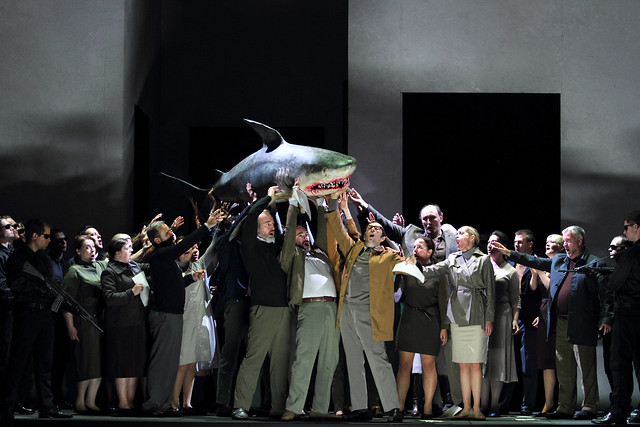At the Barbican Hall, London, Marc Minkowski conducted the BBCSO in Schubert Symphony no 4, Mahler Lieder eines fahrenden Gesellen and Hans Rott Symphony no 1. All three works were written by composers of the age of 20. It's best not to make too much of the fact that they all died too young, since none of them was aware he wouldn't grow old. It would be wiser to think of the programme as a study of the way different 20 year olds express themselves in their own individual ways.
Minkowski brought a delicious warmth to the Schubert symphony. Like most subtitles, the subtitle of this symphony is misleading. It's not "Tragic" in the grand sense of tragedy, a style which the Romantics could do with great fervour. What came over best, in Minkowski's approach, was the mature poise of Schubert's structure. The arguments put forward for not quite Sturm und Drang are resolved in gracious repose. Minowski gets a golden Romantic glow from the BBCSO. Modern instruments, placed with period sensibility, can be very beautiful.
Mahler's Lieder eines fahrenden Gesellen is a cry of Romantic anguish. No doubt Mahler was upset by being dumped by his girlfriend, but the songs are not in any way autobiographical. This time, the title is a clue: "Songs of a wandering journeyman". The inspiration almost certainly came from the poems in Des Knaben Wunderhorn, several of which Mahler had already set before he wrote LefG, and which would shape his work for many years to come.
But the big reason for listening to this concert was to hear what Minkowski and the BBC SO would make of Hans Rott. Rott is something of a cult figure with an obsessive following. Nonetheless, his music hasn't attracted really top-rank conductors, apart from Paavo Järvi, who launched his recording by repeating the claim that Mahler plagiarized Rott and suppressed his debt to him. It's true that Mahler praised Rott as a genius, but mourning a tragic, dead friend is not in itself a musical judgement. Rott can only really be evaluated by what he wrote. Minkowski, thankfully, presents Rott on his own terms as composer, so the music stands on its own terms, without the need for the kind of non-musical special pleading which usually sticks to Rott's reputation and attracts listeners who find image and supposed obscurity more interesting than actual musical context.
Minkowski conducted with even-handed sympathy, obliterating bad memories of Dennis Russell Davies' premiere recording. Rott's music is pleasant enough, and for all we know he might have evolved into a good composer, but it isn't a good sign when music seems to sound like so many different things. We "hear" Mahler because we're primed to do so because of Rott's reputation, and performances tend to follow what we expect to hear. At a push, one could hear in Rott echoes of Richard Strauss and Hugo Wolf, as well as of Brahms and Wagner. It's normal human nature to cross-reference with what you know. Rott's symphony sounds good because it sounds so familiar, poses no great demands and is very much of its time.
Perhaps these days composition students are taught that copying is a good thing, but surely the sign of a really good composer is originality? At the same time as Rott was writing his first symphony, Mahler (two years younger) was writing Das klagende Lied. Das klagende Lied is infinitely more adventurous, bridging song and symphony, early German Singspiel traditions and "modern" music drama. And Das klagende Lied is a work inspired directly from Das Knaben Wunderhorn, which Mahler wass setting in song from very early on. Mahler fans sometimes talk of Mahler's entire output as "one great symphony", forming a consistent, cohesive arc from beginning to end. In his Wunderhorn years, Mahler explores the great themes that make him so remarkable. Real ideas in music aren't little things like passages for horn or snatches of bird-song piccolo or spiky bits of percussion. Before the age of 20, in Das klagende Lied, Mahler is already exploring grand ideas like transfiguration and the ultimate triumph of new life over death. Perhaps it's a good thing that Paavo Järvi doesn't conduct much Mahler since he doesn't get what Mahler is about. Minkowski and the BBCSO do wonders for Rott, but ultimately Rott is no Mahler. PS, who wrote the presentation on Radio 3 ? Is this what BBC Radio 3 standards have fallen to?
Minkowski brought a delicious warmth to the Schubert symphony. Like most subtitles, the subtitle of this symphony is misleading. It's not "Tragic" in the grand sense of tragedy, a style which the Romantics could do with great fervour. What came over best, in Minkowski's approach, was the mature poise of Schubert's structure. The arguments put forward for not quite Sturm und Drang are resolved in gracious repose. Minowski gets a golden Romantic glow from the BBCSO. Modern instruments, placed with period sensibility, can be very beautiful.
Mahler's Lieder eines fahrenden Gesellen is a cry of Romantic anguish. No doubt Mahler was upset by being dumped by his girlfriend, but the songs are not in any way autobiographical. This time, the title is a clue: "Songs of a wandering journeyman". The inspiration almost certainly came from the poems in Des Knaben Wunderhorn, several of which Mahler had already set before he wrote LefG, and which would shape his work for many years to come.
But the big reason for listening to this concert was to hear what Minkowski and the BBC SO would make of Hans Rott. Rott is something of a cult figure with an obsessive following. Nonetheless, his music hasn't attracted really top-rank conductors, apart from Paavo Järvi, who launched his recording by repeating the claim that Mahler plagiarized Rott and suppressed his debt to him. It's true that Mahler praised Rott as a genius, but mourning a tragic, dead friend is not in itself a musical judgement. Rott can only really be evaluated by what he wrote. Minkowski, thankfully, presents Rott on his own terms as composer, so the music stands on its own terms, without the need for the kind of non-musical special pleading which usually sticks to Rott's reputation and attracts listeners who find image and supposed obscurity more interesting than actual musical context.
Minkowski conducted with even-handed sympathy, obliterating bad memories of Dennis Russell Davies' premiere recording. Rott's music is pleasant enough, and for all we know he might have evolved into a good composer, but it isn't a good sign when music seems to sound like so many different things. We "hear" Mahler because we're primed to do so because of Rott's reputation, and performances tend to follow what we expect to hear. At a push, one could hear in Rott echoes of Richard Strauss and Hugo Wolf, as well as of Brahms and Wagner. It's normal human nature to cross-reference with what you know. Rott's symphony sounds good because it sounds so familiar, poses no great demands and is very much of its time.
Perhaps these days composition students are taught that copying is a good thing, but surely the sign of a really good composer is originality? At the same time as Rott was writing his first symphony, Mahler (two years younger) was writing Das klagende Lied. Das klagende Lied is infinitely more adventurous, bridging song and symphony, early German Singspiel traditions and "modern" music drama. And Das klagende Lied is a work inspired directly from Das Knaben Wunderhorn, which Mahler wass setting in song from very early on. Mahler fans sometimes talk of Mahler's entire output as "one great symphony", forming a consistent, cohesive arc from beginning to end. In his Wunderhorn years, Mahler explores the great themes that make him so remarkable. Real ideas in music aren't little things like passages for horn or snatches of bird-song piccolo or spiky bits of percussion. Before the age of 20, in Das klagende Lied, Mahler is already exploring grand ideas like transfiguration and the ultimate triumph of new life over death. Perhaps it's a good thing that Paavo Järvi doesn't conduct much Mahler since he doesn't get what Mahler is about. Minkowski and the BBCSO do wonders for Rott, but ultimately Rott is no Mahler. PS, who wrote the presentation on Radio 3 ? Is this what BBC Radio 3 standards have fallen to?







